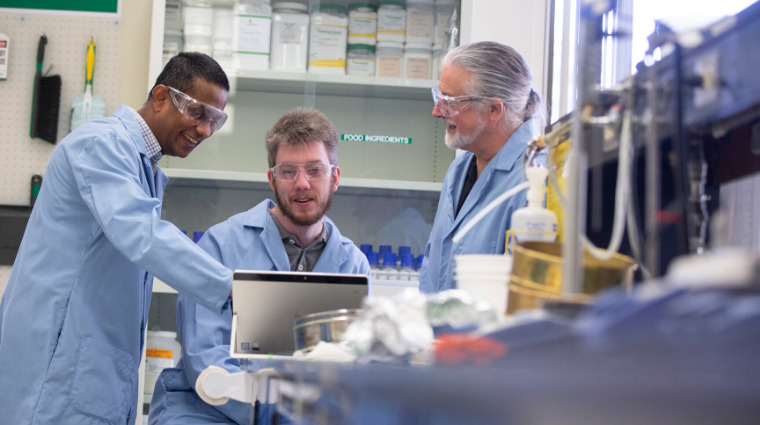
For more than 40 years, Keyleaf has harnessed science to consistently and reliably identify and isolate high-value proteins, oils and other extracts from plants. The Saskatoon based company is looking to Saskatchewan Polytechnic to harness this wealth of knowledge and bring it from the lab bench and pilot plant to full production.
Keyleaf (formerly POS Biosciences) has facilities in both Canada and the U.S., producing ingredients for products used in medical, pharmaceutical and food science applications.
Dr. Cyril Coupal, a digital integration research manager with Digital Integration Centre of Excellence (DICE), said that Keyleaf is now ramping up its operations with new state-of-the-art equipment and is looking to do the same with their processes.
“I was talking to one of the researchers and he said they do small and large batch processing, but the next step is to go to stream processing,” said Coupal. “To transfer that into a live stream continuous product – with the ability to react in time to changes to ensure consistent quality – is a challenge.”
This means pulling together information on Keyleaf processes from numerous sources, some of which are legacy, ink on-paper. The DICE team must build a framework for this data so Keyleaf personnel, from researchers to line operators, can access legacy data, add new information and get consistent directions on what settings, for example, should be used on each machine.
Coupal explained such processes are like recipes, but in Keyleaf’s case, not only does the system need to adhere to the recipe, it must do so on the fly, adjusting to variations in feedstocks or other factors.
“If plant product comes in, what do I have to adjust to compensate for the quality of the plants?” Coupal said. “What adjustments need to be made and when?”
This constant process optimization is an ideal application for machine learning and artificial intelligence. Ideally, such a system will be able to fine-tune itself. “That’s our ultimate goal,” Coupal said.
Sask Polytech’s applied research partners have access to exceptional facilities and faculty expertise, funding for research and development and a wide network of connections. By partnering in innovation and testing Sask Polytech enables companies to capture new opportunities, solve everyday problems and contribute to economic growth and job creation in Saskatchewan.
Visit saskpolytech.ca/research for more information on Applied Research and Innovation at Sask Polytech.
Published July 2020.

